- Home
- Henry Fielding
Joseph Andrews
Joseph Andrews Read online
DOVER · THRIFT · EDITIONS
All books complete and unabridged. All ″ x 8¼,″ paperbound.
Just $1.00–$2.50 in U.S.A.
A selection of the more than 200 titles in the series.
POETRY
101 GREAT AMERICAN POEMS, The American Poetry & Literacy Project (ed.). (Available in U.S. only.) 40158-8 $1.00
ENGLISH ROMANTIC POETRY: An Anthology, Stanley Appelbaum (ed.). 256pp. 29282-7 $2.00
DOVER BEACH AND OTHER POEMS, Matthew Arnold. 112pp. 28037-3 $1.50
SELECTED POEMS FROM “FLOWERS OF EVIL,” Charles Baudelaire. 64pp. 28450-6 $1.00
BHACAVADGITA, Bhagavadgita. 112pp. 27782-8 $1.50
THE BOOK OF PSALMS, King James Bible. 128pp. 27541-8 $1.50
IMAGIST POETRY: AN ANTHOLOGY, Bob Blaisdell (ed.). 176pp. (Available in U.S. Only.) 40875-2 $2.00
BLAKE’S SELECTED POEMS, William Bake. 96pp. 28517-0 $1.00
SONGS OF INNOCENCE AND SONGS OF EXPERIENCE, William Blake. 64pp. 27051-3 $1.00
THE CLASSIC TRADITION OF HAIKU: An Anthology, Faubion Bowers (ed.). 96pp. 29274-6 $1.50
BEST POEMS OF THE BRONTE SISTERS (ed. by Candace Ward), Emily, Anne, and Charlotte Brontë. 64pp. 29529-X $1.00
SONNETS FROM THE PORTUGUESE AND OTHER POEMS, Elizabeth Barrett Browning. 64pp. 27052-1 $1.00
MY LAST DUCHESS AND OTHER POEMS, Robert Browning. 128pp. 27783-6 $1.00
POEMS AND SONGS, Robert Bums. 96pp. 26863-2 $1.00
SELECTED POEMS, George Gordon, Lord Byron. 112pp. 27784-4 $1.50
SELECTED CANTERBURY TALES, Geoffrey Chaucer. 144pp. 28241-4 $1.50
“LORD RANDAL” AND OTHER BRITISH BALLADS, Francis James Child (ed.). 64pp. 28987-7 $1.00
THE RIME OF THE ANCIENT MARINER AND OTHER POEMS, Samuel Taylor Coleridge. 80pp. 27266-4 $1.00
WAR IS KIND AND OTHER POEMS, Stephen Crane. 64pp. 40424-2 $1.00
THE CAVALIER POETS: An Anthology, Thomas Crofts (ed.). 80pp. 28766-1 $1.00
SELECTED POEMS, Emily Dickinson. 64pp. 26466-1 $1.00
SELECTED POEMS, John Donne. 96pp. 27788-7 $1.50
SELECTED POEMS, Paul Laurence Dunbar. 80pp. 29980-5 $1.00
“THE WASTE LAND” AND OTHER POEMS, T. S. Eliot. 64pp. (Available in U.S. only.) 40061-1 $1.00
THE CONCORD HYMN AND OTHER POEMS, Ralph Waldo Emerson. 64pp. 29059-X $1.50
THE RUBÁIYÁT OF OMAR KHAYYÁM: FIRST AND FIFTH EDITIONS, Edward FitzGerald. 64pp. 26467-X $1.00
A BOY’S WILL AND NORTH OF BOSTON, Robert Frost. 112pp. (Available in U.S. only.) 26866-7 $1.00
THE ROAD NOT TAKEN AND OTHER POEMS, Robert Frost. 64pp. (Available in U.S. only.) 27550-7 $1.00
HARDY’S SELECTED POEMS, Thomas Hardy. 80pp. 28753-X $1.50
“GOD’S GRANDEUR” AND OTHER POEMS, Gerard Manley Hopkins. 80pp. 28729-7 $1.00
DOVER THRIFT EDITIONS
GENERAL EDITOR: PAUL NEGRI
EDITOR OF THIS VOLUME: JOHN BERSETH
Copyright
Copyright © 2001 by Dover Publications, Inc.
All rights reserved under Pan American and International Copyright Conventions.
Published in Canada by General Publishing Company, Ltd., 895 Don Mills Road, 400-2 Park Centre, Toronto, Ontario, M3C 1W3.
Published in the United Kingdom by David & Charles, Brunel House, Forde Close, Newton Abbot, Devon TQ12 4PU.
Bibliographical Note
This Dover edition, first published in 2001, is an unabridged republication of a standard edition of the work which was originally published in London in 1742 under the title The History of the Adventures of Joseph Andrews and His Friend Mr. Adams, Written in Imitation of the Manner of Cervantes.
Library of Congress Cataloging-in-Publication Data
Fielding, Henry, 1707–1754.
[History of the adventures of Joseph Andrews] Jo
seph Andrews / Henry Fielding.
p. cm.
9780486110820
1. England—Fiction. 2. Domestics—Fiction. 3. Young men—Fiction. 4. Male friendship—Fiction. 5. Social classes—Fiction. 6. Clergy—Fiction. 1. Title.
PR3454 J65 2001
823’.5–dc21
2001028000
Manufactured in the United States of America
Dover Publications, Inc., 31 East 2nd Street, Mineola, N.Y. 11501
Note
HENRY FIELDING (1707–1754), son of a general and an heiress, was born in Somerset and grew up in Dorset, both in the west of England. He was educated at Eton College, then moved to London, where his play Love and Several Masques was produced at the Drury Lane Theatre in 1728. A restless, adventurous youth, he went to the Netherlands to study at the University of Leiden, but was forced to return to London in 1730 after his allowance was cut off. Over the next seven years twenty-five of his plays were produced, many satirizing contemporary politicians and other public figures. Fielding’s work, facile and witty, was popular with audiences, especially the farce Tom Thumb (1730). But officialdom held a dim view of the young author, and in 1737 one of his targets, Prime Minister Sir Robert Walpole, presided over passage of the Licensing Act. This law called for the lord chamberlain to license all plays before production, in effect censoring the works and ending Fielding’s theatrical career.
In 1740 Samuel Richardson’s Pamela, generally considered to be the first novel in the English language, was published to popular acclaim. The next year, when the parody Shamela (An Apology for the Life of Mrs. Shamela Andrews) appeared, it was attributed to, but not claimed by, Henry Fielding. Nevertheless, the work was clearly related to his next satirical work Joseph Andrews (1742), both stylistically and in content. Critics consider the latter work much more than parody, as Fielding’s talent for characterization, high comedy, and social criticism raised his novel to the level of greatness. Joseph is seen as an admirable hero, and Parson Adams, virtuous but a bit foolish, is one of the great comic characters in English literature. The Russian novelists Tolstoy and Dostoevsky were among the writers who expressed admiration for Joseph Andrews and Fielding’s other novels. Many critics see Fielding’s work as part of the picaresque tradition, recounting the adventures of an amusing, clever, often admirable rogue. There are echoes of this tradition in Joseph Andrews, but it is more pronounced in the mock epic Jonathan Wild, published in 1743 as part of the three-volume Miscellanies, and in Tom Jones (1749), Fielding’s most popular work. His last novel, Amelia (1751), is suffused with an increasingly somber view of 18th-century English society.
Henry Fielding was a prolific writer—in addition to his novels he also edited and wrote for journals of opinion, including The Champion (1739–41), The True Patriot (1745–46), and The Jacobite’s Journal (1747)—but he also devoted much energy to the practice of law. He was admitted to the bar in 1740 and, through the influence of a patron, was appointed justice of the peace for Westminster in 1748. Honest and hard-working, though increasingly hampered by illness, Fielding used his position to strengthen the London police and to break the power of the criminal gangs in the city. He resigned in 1753 and soon traveled to Portugal in hopes of regaining his health. Rejuvenated at first, he had a relapse and died in Lisbon on August 7, 1754. His Journal of a Voyage to Lisbon was published in England the next year.
Preface
AS it is possible the mere English reader may have a different idea of romance with the author of these little volumes, and may consequently expect a kind of entertainment not to be found, nor which was even intended, in the following pages; it may not be improper to premise a few words concerning this kind of writing, which I do not remember to have seen hitherto attempted in our language.
The Epic, as well as the Drama, is divided into tragedy and comedy. Homer, who was the father of this species of poetry, gave us a
pattern of both these, though that of the latter kind is entirely lost; which Aristotle tells us, bore the same relation to comedy which his Iliad bears to tragedy. And perhaps, that we have no more instances of it among the writers of antiquity, is owing to the loss of this great pattern, which, had it survived, would have found its imitators equally with the other poems of this great original.
And farther, as this poetry may be tragic or comic, I will not scruple to say it may be likewise either in verse or prose: for though it wants one particular, which the critic enumerates in the constituent parts of an epic poem, namely metre; yet, when any kind of writing contains all its other parts, such as fable, action, characters, sentiments, and diction, and is deficient in metre only; it seems, I think, reasonable to refer it to the epic; at least, as no critic hath thought proper to range it under any other head, or to assign it a particular name to itself.
Thus the Telemachus of the archbishop of Cambray appears to me of the epic kind, as well as the Odyssey of Homer; indeed, it is much fairer and more reasonable to give it a name common with that species from which it differs only in a single instance, than to confound it with those which it resembles in no other. Such as those voluminous works, commonly called romances, namely, Clelia, Cleopatra, Astræa, Cassandra, the Grand Cyrus, and innumerable others, which contain, as I apprehend, very little instruction or entertainment.
Now, a comic romance is a comic epic poem in prose; differing from comedy; as the serious epic from tragedy: its action being more extended and comprehensive; containing a much larger circle of incidents, and introducing a greater variety of characters. It differs from the serious romance in its fable and action, in this; that as in the one these are grave and solemn, so in the other they are light and ridiculous: it differs in its characters by introducing persons of inferior rank, and consequently, of inferior manners, whereas the grave romance sets the highest before us: lastly, in its sentiments and diction; by preserving the ludicrous instead of the sublime. In the diction, I think, burlesque itself may be sometimes admitted; of which many instances will occur in this work, as in the description of the battles, and some other places, not necessary to be pointed out to the classical reader, for whose entertainment those parodies or burlesque imitations are chiefly calculated.
But, though we have sometimes admitted this in our diction, we have carefully excluded it from our sentiments and characters; for there it is never properly introduced, unless in writings of the burlesque kind, which this is not intended to be. Indeed, no two species of writing can differ more widely than the comic and the burlesque; for as the latter is ever the exhibition of what is monstrous and unnatural, and where our delight, if we examine it, arises from the surprising absurdity, as in appropriating the manners of the highest to the lowest, or è converso; so in the former we should ever confine ourselves strictly to nature, from the just imitation of which will flow all the pleasure we can this way convey to a sensible reader. And perhaps there is one reason why a comic writer should of all others be the least excused for deviating from nature, since it may not be always so easy for a serious poet to meet with the great and the admirable; but life everywhere furnishes an accurate observer with the ridiculous.
I have hinted this little concerning burlesque, because I have often heard that name given to performances which have been truly of the comic kind, from the author’s having sometimes admitted it in his diction only; which, as it is the dress of poetry, doth, like the dress of men, establish characters (the one of the whole poem, and the other of the whole man), in vulgar opinion, beyond any of their greater excellences: but surely a certain drollery in style, where characters and sentiments are perfectly natural, no more constitutes the burlesque, than an empty pomp and dignity of words, where every thing else is mean and low, can entitle any performance to the appellation of the true sublime.
And I apprehend my lord Shaftesbury’s opinion of mere burlesque agrees with mine, when he asserts there is no such thing to be found in the writings of the ancients. But perhaps I have less abhorrence than he professes for it; and that, not because I have had some little success on the stage this way, but rather as it contributes more to exquisite mirth and laughter than any other; and these are probably more wholesome physic for the mind, and conduce better to purge away spleen, melancholy, and ill affections, than is generally imagined. Nay, I will appeal to common observation, whether the same companies are not found more full of good-humour and benevolence, after they have been sweetened for two or three hours with entertainments of this kind, than when soured by a tragedy or a grave lecture.
But to illustrate all this by another science, in which, perhaps, we shall see the distinction more clearly and plainly, let us examine the works of a comic history painter, with those performances which the Italians call caricatura, where we shall find the true excellence of the former to consist in the exactest copying of nature; insomuch that a judicious eye instantly rejects anything outré, any liberty which the painter hath taken with the features of that alma mater; whereas in the caricatura we allow all licence,—its aim is to exhibit monsters, not men; and all distortions and exaggerations whatever are within its proper province.
Now, what caricatura is in painting, burlesque is in writing; and in the same manner the comic writer and painter correlate to each other. And here I shall observe, that, as in the former the painter seems to have the advantage; so it is in the latter infinitely on the side of the writer; for the monstrous is much easier to paint than describe, and the ridiculous to describe than paint.
And though perhaps this latter species doth not in either science so strongly affect and agitate the muscles as the other; yet it will be owned, I believe, that a more rational and useful pleasure arises to us from it. He who should call the ingenious Hogarth a burlesque painter, would, in my opinion, do him very little honour; for sure it is much easier, much less the subject of admiration, to paint a man with a nose, or any other feature, of a preposterous size, or to expose him in some absurd or monstrous attitude, than to express the affections of men on canvas. It hath been thought a vast commendation of a painter to say his figures seem to breathe; but surely it is a much greater and nobler applause, that they appear to think.
But to return. The ridiculous only, as I have before said, falls within my province in the present work. Nor will some explanation of this word be thought impertinent by the reader, if he considers how wonderfully it hath been mistaken, even by writers who have professed it: for to what but such a mistake can we attribute the many attempts to ridicule the blackest villainies, and, what is yet worse, the most dreadful calamities? What could exceed the absurdity of an author, who should write the comedy of Nero, with the merry incident of ripping up his mother’s belly? or what would give a greater shock to humanity than an attempt to expose the miseries of poverty and distress to ridicule? And yet the reader will not want much learning to suggest such instances to himself.
Besides, it may seem remarkable, that Aristotle, who is so fond and free of definitions, hath not thought proper to define the ridiculous. Indeed, where he tells us it is proper to comedy, he hath remarked that villany is not its object: but he hath not, as I remember, positively asserted what is. Nor doth the Abbé Bellegarde, who hath written a treatise on this subject, though he shows us many species of it, once trace it to its fountain.
The only source of the true ridiculous (as it appears to me) is affectation. But though it arises from one spring only, when we consider the infinite streams into which this one branches, we shall presently cease to admire at the copious field it affords to an observer. Now, affectation proceeds from one of these two causes, vanity or hypocrisy: for as vanity puts us on affecting false characters, in order to purchase applause; so hypocrisy sets us on an endeavour to avoid censure, by concealing our vices under an appearance of their opposite virtues. And though these two causes are often confounded (for there is some difficulty in distinguishing them), yet, as they proceed from very different motives, so
they are as clearly distinct in their operations: for indeed, the affectation which arises from vanity is nearer to truth than the other, as it hath not that violent repugnancy of nature to struggle with, which that of the hypocrite hath. It may be likewise noted, that affectation doth not imply an absolute negation of those qualities which are affected; and, therefore, though, when it proceeds from hypocrisy, it be nearly allied to deceit; yet when it comes from vanity only, it partakes of the nature of ostentation: for instance, the affectation of liberality in a vain man differs visibly from the same affectation in the avaricious; for though the vain man is not what he would appear, or hath not the virtue he affects, to the degree he would be thought to have it; yet it sits less awkwardly on him than on the avaricious man, who is the very reverse of what he would seem to be.
From the discovery of this affectation arises the ridiculous, which always strikes the reader with surprise and pleasure; and that in a higher and stronger degree when the affectation arises from hypocrisy, than when from vanity; for to discover any one to be the exact reverse of what he affects, is more surprising, and consequently more ridiculous, than to find him a little deficient in the quality he desires the reputation of. I might observe that our Ben Jonson, who of all men understood the ridiculous the best, hath chiefly used the hypocritical affectation.
Now, from affectation only, the misfortunes and calamities of life, or the imperfections of nature, may become the objects of ridicule. Surely he hath a very ill-framed mind who can look on ugliness, infirmity, or poverty, as ridiculous in themselves: nor do I believe any man living, who meets a dirty fellow riding through the streets in a cart, is struck with an idea of the ridiculous from it; but if he should see the same figure descend from his coach and six, or bolt from his chair with his hat under his arm, he would then begin to laugh, and with justice. In the same manner, were we to enter a poor house and behold a wretched family shivering with cold and languishing with hunger, it would not incline us to laughter (at least we must have very diabolical natures if it would); but should we discover there a grate, instead of coals, adorned with flowers, empty plate or china dishes on the sideboard, or any other affectation of riches and finery, either on their persons or in their furniture, we might then indeed be excused for ridiculing so fantastical an appearance. Much less are natural imperfections the object of derision; but when ugliness aims at the applause of beauty, or lameness endeavours to display agility, it is then that these unfortunate circumstances, which at first moved our compassion, tend only to raise our mirth.

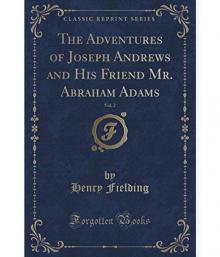 Joseph Andrews, Vol. 2
Joseph Andrews, Vol. 2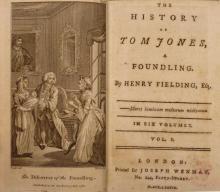 History of Tom Jones, a Foundling
History of Tom Jones, a Foundling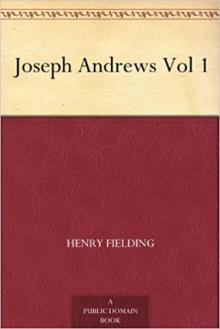 Joseph Andrews, Vol. 1
Joseph Andrews, Vol. 1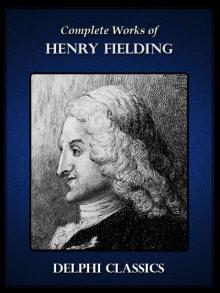 Complete Fictional Works of Henry Fielding
Complete Fictional Works of Henry Fielding The History of Tom Jones (Penguin Classics)
The History of Tom Jones (Penguin Classics)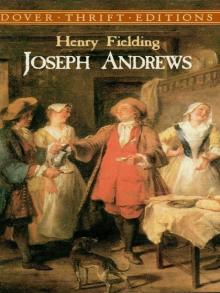 Joseph Andrews
Joseph Andrews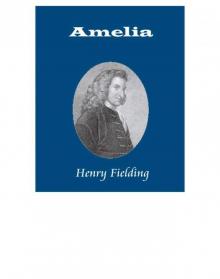 Amelia
Amelia